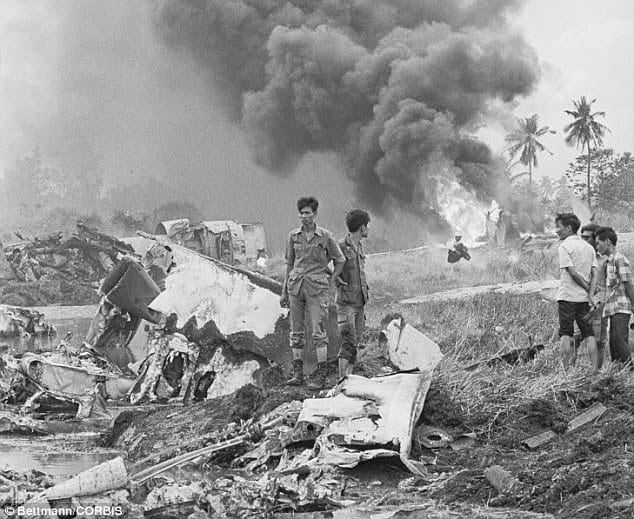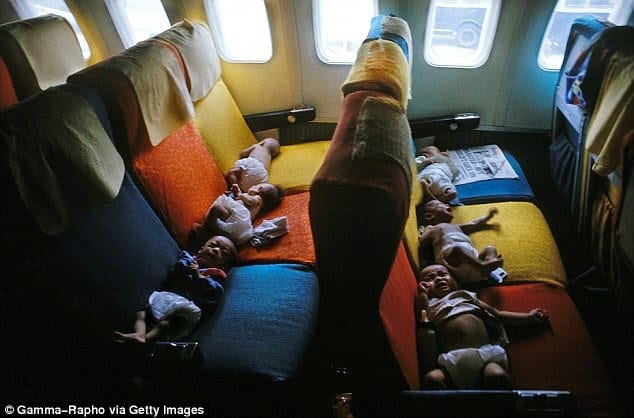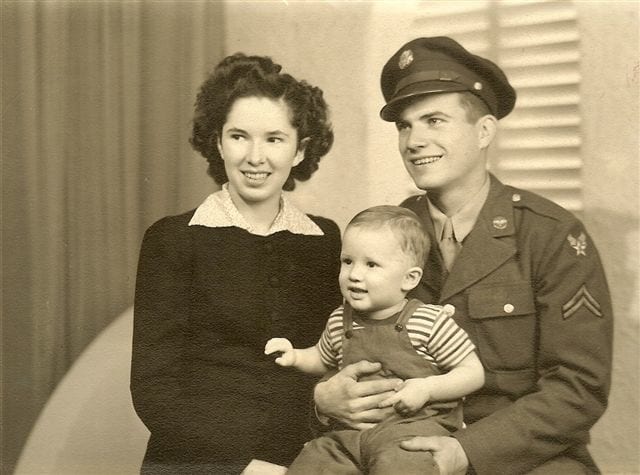Photo of my father as a baby sitting with his father and mother.
It’s Memorial Day and I’m thinking about my dad. He died several years ago on May 2, but Memorial Day conjures up complicated emotions for me because he was such a proud Marine. From the time of my first memories, I somehow knew this about my father, despite the fact that he had been retired for many years prior to my birth.
He wore his Marine Corps ring as proudly as his thick head of hair and flew the US flag outside every house he ever lived in. He had military lapel pins and his behavior bore more permanent traces of his indoctrination – a penchant for tidiness and a concomitant disdain for clutter, a commitment to regular physical exercise, a lack of patience for laziness and a stark fear of things he couldn’t control. This fear didn’t look like fear on my father, though, it looked like rigid boundaries, sharp edges and short leashes. It looked as though he had everything figured out and he wanted to avoid wasting time by telling us all how to do it, everything, Life.
I don’t know how old I was when I learned he had been in Vietnam and there were so many stories running through our lives as our family imploded, it was hard to find reality among the golden threads woven in to catch our attention. In some stories he was a helicopter pilot, in others he flew planes. There were always model planes around the house and Dad had a jumpsuit in his closet he referred to as his “flight suit.” After the divorce when Mom’s bitter hurt led her to discredit him at every turn in order to craft a world for us where there were winners and losers, Right and Wrong (and she was the “Right,”) she scornfully told us that he had been a mechanic – he had never flown planes or choppers. That he was a pathological liar. I was so angry at his leaving that I sopped up every story and let myself choose her side.
As a young mother, I read Tracy Kidder’s book “My Detachment” about his tour of duty in Vietnam and I recall being physically struck with heartache at what so many young men of my father’s generation experienced. My father and I had recently begun creating a new relationship founded in our present-day lives where we were both there because we wanted to be, not because I needed him and he had to be there. After I finished the book, I wrote him a letter full of what I hoped would come off as compassion and love. He had never talked about his experiences in the war and he didn’t seem to have any ties to people he had served with. While he identified as a Marine, it was in a fairly generic sense and he didn’t appreciate inquiries about the details of his service in Vietnam. In my letter, I said that I understood why he didn’t want to revisit those memories and I didn’t want him to talk about them, but I hoped he knew how badly I felt for the kid he was – newly married, newly graduated from college with a fresh start ahead of him thanks to his ROTC enrollment – suddenly yanked a world away to a jungle where his job was to kill other young men. Where his life was not his own, but was dependent on being in the right place at the right time, with land mines exploding around him and his team members dying right in front of him, not knowing if he would ever get the chance to meet the child his wife carried in her belly. I can’t imagine what that does to someone.
He never answered my letter.
I don’t think I expected him to, but I wanted him to know that I felt like it explained a lot. That coming home to a world that was pretty much the way it had been when he left – with friends meeting for coffee and driving to the grocery store and sleeping on mattresses with clean sheets – and trying to find a way to cope with the memories must have been torture.
He died at the age of 65 from a very aggressive form of lung cancer. This man who had exercised nearly every day of his life, never smoked a cigarette and barely drank alcohol. A man who ate the healthiest foods he could find and didn’t drink coffee and had no risk factors for lung cancer. A man who likely inhaled copious amounts of Agent Orange as it was dropped onto the Vietnamese jungles.
About 18 months after he died his wife gave me some boxes she found in the closet in his office. They contained slide carousels full of photos and an ancient slide projector I recognized instantly. There were boxes and boxes of slides, labeled meticulously, and when I got home I set up the projector on the kitchen table and began clicking through the carousels – watching my parents with their 1960s polyester outfits visit places like Cape Canaveral and Disneyland. Looking at shots of birthdays and Christmas celebrations I hadn’t seen since the 1970s. And then I got to a carousel labeled, simply, “Vietnam.” I am fairly certain I didn’t take a breath as I dislodged the old carousel and fitted this one on to the projector. I know I convinced Bubba to take the girls upstairs for a bath. And then I advanced the first slide. And there was my father, in his camo greens digging a trench with a group of other boys on a beach. Click. Tents and cots. Click. Photos of three crew-cut, farmer-tanned teenagers grinning for the camera and flexing their biceps. Click. My father standing on a paved airstrip next to a US Marine helicopter in his flight suit. A series of shots showed six soldiers loading in to the helicopter, one by one, with their parachutes strapped to their backs. And then the chopper lifted a few feet off the ground. I pictured my father standing behind the camera, taking shot after shot as the chopper flew higher and higher. A few photos later, the chopper was a largeish speck in the blue sky, floating above the ocean and, barely discernable, a somewhat smaller speck on the opposite side of the photo. Click. the tiny speck gets closer. Click. Still closer. Click. By now it is clear that one speck is chasing the other one. Click. A smoke trail appears in the shot as if someone were drawing a chalk line between the two specks. Click. The helicopter explodes into flames.
I sat down hard. My father filmed his fellow soldiers as their helicopter was blown out of the sky on an impossibly blue day. Soldiers he had eaten with, built camp with, trained with, laughed with. He watched them die. And he probably had to go up in a helicopter himself the next day.
Whether or not he believed in the reason he was there, I don’t know. I suspect he never really got much chance to think about it. He did what he was asked to do.
When he was alive, I didn’t make any special effort to honor my father on Memorial Day or Veterans’ Day. My sole effort to appreciate his tour(s) of duty lay in that letter I wrote to him. While I disagree with war as a solution to anything, I believe in supporting the individual human beings who serve in the military and I wish I had found a way to let my Dad know I am proud of him. I am proud of his service in the Marine Corps. I think he might be watching somewhere now, though, and I hope he can hear me playing Taps for him.





